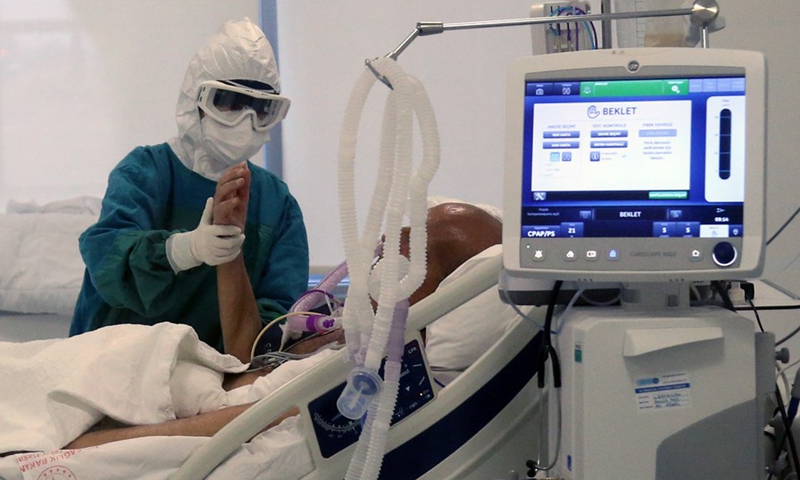
A Turkish health worker joins in a moment of silence in front of a hospital building in Istanbul,Turkey on April 2, 2020.(Photo: Xinhua)

A doctor treats a COVID-19 patient at an ICU in a hospital in Ankara, Turkey on Jan. 8, 2021.(Photo: Xinhua)

Medical staffs perform a surgery for a COVID-19 patient with femur fracture at the Sancaktepe Sehit Prof. Dr. Ilhan Varank Training and Research Hospital in Istanbul, Turkey, May 4, 2020.(Photo: Xinhua)
Violence from patients, low wages, and extreme working conditions that inflict on Turkey's health workers during the COVID-19 pandemic has compelled lots of them to quit the job or seek opportunities abroad, according to their unions.
Tens of thousands of Turkish healthcare employees and social support personnel held a one-day nationwide strike on Dec. 15 demanding better pay, lower workload, and more safety measures.
Health workers are complaining about the rise of the cost of living as inflation soared to 36.1 percent annually in 2021, and the Turkish currency lira lost over 40 percent of its value against the U.S. dollar amid the country's economic troubles.
The Turkish Medical Association (TTB), the leading union of health workers, said in a statement in Dec. 2021 that many medical professionals have sought to leave the country due to worsening working conditions.
Coskun, a general practitioner doctor in a state-owned clinic in the capital Ankara, told Xinhua that with a salary increase in January, he is expected to receive around 10,000 liras per month, equivalent to 725 dollars, already much higher than the minimum wage of 4,250 liras, roughly 300 dollars, for workers in all job sectors in Turkey.
"The working conditions are difficult and stressful. We have to treat dozens of patients each day," said the doctor in his early 40s, stressing that the pandemic put a heavy strain on the already strenuous working conditions.
Violence against doctors is systematically making headlines in Turkey. Two weeks ago, a patient in need of urgent medical attention injured a physician at the Didim state hospital in the western province of Aydin.
More than 100,000 doctors have been physically and verbally assaulted in the last 11 years, and at least 10 have been killed by patients, according to the TTB.
"Besides economic woes that all citizens are experiencing with soaring prices, we also have to deal with the abuse and sometimes violent behavior of patients who are unsatisfied with the way we treat them or our diagnosis," Coskun added.
Turkey is recording a surge in daily COVID-19 cases due to the spread of the Omicron variant of the coronavirus. On Tuesday, the Health Ministry reported over 74,000 patients in 24 hours, an all-time high, and 137 deaths.
Facing hardships, more and more doctors and dentists are seeking to work in western countries.
Gamze, a dentist working in a state-owned hospital, told Xinhua that several of her colleagues have left Turkey for Germany.
According to figures provided by the TTB, the number of doctors who left Turkey in the first 11 months of 2021 was 1,361, up from 59 in 2012.
The TTB also reported that more than 8,000 state-employed doctors resigned in 2020, the first year of the pandemic.
Despite all the problems, Turkey's healthcare system has robust infrastructure and advanced medical faculties. The country is also pinning its hope on a growing health tourism sector treating tens of thousands of foreigners each year for numerous ailments.
Saying he would not work in another country, Coskun stressed that he wanted to be there for "his people."
"I choose to be in this profession to help my fellow citizens and get them the medical attention they need. What we all want is the hard work to be recognized by the authorities with better working conditions and wages," he added.
